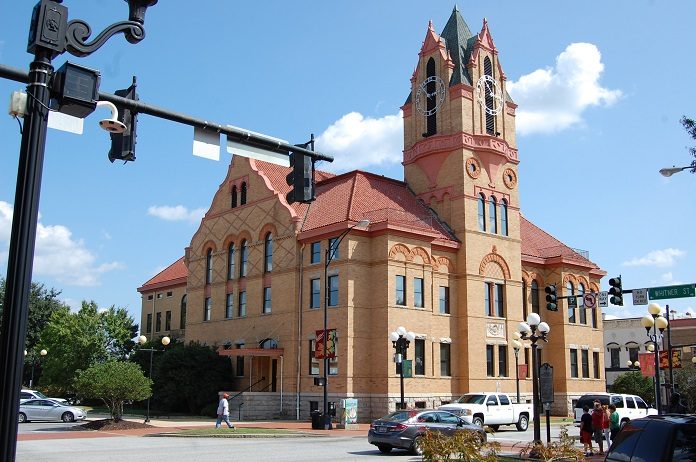Anderson School District One officials presented information from a recently completed Impact Fee study to Anderson County Council and members of the County Planning Commission last Thursday.
The fee is being proposed to help offset costs associated with tremendous growth District One is currently experiencing and expecting over the next ten years.
Board Chair Nancy Upton and Boardmember Mike Wilson spoke. District One Superintendent Robbie Binnicker and TischlerBise consulting firm president Carson Bise also presented information
Binnicker spoke on the increase in new housing coming into the school district and the resulting pressures on capacity for District One schools.
Binnicker said District One averages 100 to 300 new students each year. This past year, the number was 500.
“People purchasing new homes in the district are creating demand,” Binnicker said. “The need for housing is pretty great in Anderson District One.”
“New homeowners should pay their proportional fair share,” Binnicker said. “What is causing this stress is new homes and apartments.”
TischlerBise President Carson Bise presented the information from the recently conducted Impact Fee study done by his firm.
Bise said the study looked at costs and projections of school construction, land, activity buses, administrative space and credits for future payment on debt.
The study made recommendations of an impact fee maximum of $11,208 for single family construction and $7,779 for multifamily construction.
County Council members asked several questions regarding the District One Fund Balance, property taxes and the one cent Local Option Sales Tax.
County Councilman Ray Graham expressed concerns about the impact fee affecting the number of people moving into the district and on young families.
The study shows that schools in the district are at more than 85 percent capacity and have little room for the growth. The study suggests almost 1,000 additional students will enter the district over the next 10 years.
Binnicker said growth in areas of South Carolina that already have impact fees has not slowed.
School officials said current residents of the district will not be impacted by the fee and could see a decrease in tax millage rates once the impact fees are in place.
District One is the fastest growing part of the county and enrollment is expected to increase by 1000 students over the next 10 years.
Approximately 2,000 new housing units are currently approved or under consideration in District One in recent months, including 732 already approved in the Piedmont-Wren area.
Anderson County Council Chairman Tommy Dunn said, “I agree this will help tremendously, but you are still going to have to sell bonds or find other ways to raise funds.”
Binnicker agreed, stating that the schools will have to be built no matter the funding methods.
Binnicker explained that South Carolina Act 388 is being blamed for a huge shortfall in the district. The act, which shifted funding from homeowners to a statewide penny sales tax has cost the district $25 million per year, Binnicker said.
Anderson County Councilwoman Cindy Wilson, whose family has owned property in the school district for more than 100 years, praised the district for their handling of finances.
“The district spends one of the least amounts per student in the state and is still one of the top districts,” Wilson said. “My hat’s off to ya’ll.”
Wilson added that the demand for families seeking to live in the district is being “slammed” by people from Greenville wanting to live in the area.
Anderson County Councilman Ray Graham expressed concerns about the other Anderson County school districts wanting to follow suit with their own impact fees if they are approved for School District One.
“If one does it, the others are going to follow suit, because it’s another way to raise revenue,” Graham said. “I understand the importance of education, but I am not sure this is the way to do it.”
“We’ve got to figure out how to finance this growth,” said Anderson County Councilman Jimmy Davis who represents County Council District 6. “State law that provides this opportunity and limits in the way we can pay for it.”
The presentation was for information only and no vote was taken.
The proposed impact fee will be considered by the Anderson County Planning Commission and they will present a recommendation to County Council. The proposal will then require three readings to become law.
If the county adopts it on behalf of District One, the fee will be collected from developers when obtaining a building permit for new residential construction in the school district.















